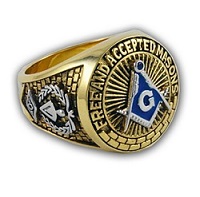Masonic Investigative Committee
Masonic Investigation Interview
Duties and Responsibilities
The Masonic Investigative Committee has one duty to perform and that is to find whether the candidate is worthy and well-qualified to become a member of the oldest and largest fraternity in the world...that of Freemasonry.
Duty of the Master
Several committees are appointed by the Worshipful Master of a Lodge, but no committee is more important and vital to the welfare of the Lodge and to the craft of Freemasonry as the Masonic Investigative Committee, whose members are appointed to perform a Masonic investigation interview of each Petitioner for the Degree of Freemasonry.
The best interests of Masonry demand that an exhaustive investigation be made of the character and standing of every applicant.
It is imperative, therefore, that this committee provide a thorough investigation of the petitioner.
The Worshipful Master should carefully review the lodge’s members to select those who have investigative experience or skill, as not all members of the Brethren are adept at investigating a prospective member, wherein personal questions must be asked in a fair and non-discriminatory manner.
Responsibilities
of the
Masonic Investigative Committee
The Lodge Brothers who are appointed by the Worshipful Master to serve as a member of the Investigative Committee should consider such appointment to be a high honor because it is a visible expression of the implicit trust and confidence in not only his ability, but his concern for the welfare of the lodge, its Brethren and Freemasonry.
Much like the Tiler, the Masonic Lodge Investigative Committee must make sure that no man not fitted for the teachings and blessings of Freemasonry be allowed to pass through the West Gate to initiation.
In the Charge at raising, our duty in this respect is clearly and unmistakably pointed out to us: "To preserve the reputation of the Fraternity unsullied must be your constant care."
Besides being an admonition to us in the daily conduct of our lives, it also includes the acceptance of petitioners.
Duties of the Masonic Investigative Committee
As members of the Investigative Committee, you are answerable to no one except your conscience.
Your Lodge and Freemasonry are dependent upon your best efforts and keen judgment. You are screening a person who has the ability to make the structure of Freemasonry within your lodge either stronger or weaker by his very presence.
It is, therefore, your solemn duty to perform the following checklist upon yourself before you begin to investigate a candidate.
Unbiased Opinion: Each member of the Masonic Investigative Committee must be unbiased by improper solicitations and uninfluenced by any possible mercenary motives by the Candidate, other Brothers or well meaning friends or relatives of the prospect.
Remember: You are simply searching for more light.
Friendly, Curious, Helpful, Professional Manner: After introductions, the Masonic Investigation begins by asking questions of the candidate as well as of his chosen references and any other contacts who have knowledge of his character and reputation.
Be prepared to ask lots of questions in a friendly, curious, helpful and professional manner.
Because the candidate knows very little about Masonry, at this very moment, you and your Masonic Investigative Committee team represent the whole of Freemasonry to the prospective candidate.
Stay on Topic: Because you represent the whole of the craft of Freemasonry to the Petitioner, do not digress (go off topic) and begin to tell a long story about yourself, your children, your initiation, your Past Master experiences, etc.
This is very unprofessional and while the Petitioner may listen politely and smile or laugh, appropriately, this is not of benefit to the Petitioner.
Your Attire: Dress plays a part in the impression the lodge and the Fraternity will make on the petitioner and his family.
Dress appropriately, but don’t over dress or under dress for the interview. Just as you will judge the impression the petitioner makes on you; know that he, too, being human, will be judging you (and Freemasonry).
While there is a long list of do's and don’t toward making a good first impression, since you are an adult, simply make it obvious that you and your Masonic Investigative Committee have taken care to make a good impression.
This will tell the petitioner and his family, in a subtle way, that the lodge members are proud of their fraternity and are particular about who gains admission to its society and its customs.
Begin Asking Questions:
Question His Petition Signers: Ask questions of everyone it is possible to contact, beginning with talking to the Brothers who signed his petition.
Ask them why they signed his petition. Require answers beyond, "He wants to be a Mason".
Find out what they really know about him, how long they have known him, who introduced them to him and why.
Ask them for names of people they know who are associated with the petitioner or know him, personally.
Question his
References:
Seek out and go IN PERSON to the men who the petitioner
gave as his references.
1. Did they know they were being used as references?
2. Why do they think they were given as references?
3. How do they feel about the petitioner?
A. As a friend?
B. As a colleague?
C. As a relative, neighbor, etc.
4. Are there any ties
that would suggest that their
assessments of his character would not be
completely honest and straight forward? Do they
gain anything
by his membership in a world wide
Fraternity?
A. Note carefully the
responses to your questions.
Are they given quickly, in a straight forward
manner while they look you in the eye, or do they
hesitate, shuffle their feet
or look away from you?
B. Do they give you a
long detailed answer that went
off-topic and effectively said nothing or is the
answer brief and to the point, clearly answering
your inquiry? If you get
too many evasive
answers, take this as a sure
indication the
committee needs to dig further and ask more
probing questions.
The committee must seek the truth about the depth of the character of all whom they investigate. Just as importantly, they must consider the financial circumstances of the petitioner, the organizations he is already involved in, the kind of company he keeps, the reputation he has in the community, in his work place, and with the general public he comes in contact with every day.
Instructions to Masonic Investigative Committee Members
The best interests of Masonry demand that an exhaustive investigation be made of the character and standing of each and every applicant. It is, therefore, imperative that your investigation of the petitioner be thorough.
Visiting the Petitioner: The LAST STEP in the process of investigating a prospective candidate should be the personal interview with the petitioner in his home…WITH HIS FAMILY PRESENT.
Make an Appointment: When you request your appointment to visit with the petitioner, make sure you make it clear that you need some uninterrupted time without the possibility of a conflict.
Just as you can’t hold a conversation while the TV is on, neither should you schedule interviews on Monday night during football season, on a holiday, etc.
This is the beginning of a new relationship, both for the petitioner and your lodge. Neither the petitioner’s heart nor his mind
are likely to be on the interview, and yours probably won’t be there either!
Take mental note of the
following:
1. Does the petitioner
welcome you unhesitatingly
into his home?
2. Does his wife greet
the Masonic Investigative
Committee warmly, and make a genuine attempt
to make
you feel at home or is she merely
tolerating your presence?
Any one who is expected to spend many hours and a sum of money with a fraternal organization must have the support, with little or no reservation of his wife and family.
Any man who is torn between two commitments, especially when one is wife and
family, is going to solve his problem by negating one of his commitments and it
is likely to be the Fraternity.
Spending many hours initiating a man, teaching
him the ritual, and developing a reliance on his contributions to the lodge is a
useless expenditure of time and money if there is doubt from the beginning that
he will be a committed member.
The Interview:
While there may well be settings other than a home interview, the home interview
is deemed the best because you will get a feeling of the man, himself, his
family, his surroundings, any other organizations he is a part of, etc.
Good manners dictate that you will interview the petitioner in the room of the house into which he invites you.
This will probably be the room which he and his wife feel most comfortable in or are the proudest of. If possible, however, conduct your interview in the living room or the family room.
Try to stay away from the dining room or kitchen. The living room is less likely to have distractions. If there is a TV, if at all possible, in a friendly manner, request that it be turned off, so you can talk without interruptions.
While in the interests of time lost, and realizing that some members of the Masonic Investigative Committee may disagree with me, it is my firm belief that if the petitioner will not turn the TV off, he is not truly ready to be interviewed and another appointment should be set, rather than trying to out-shout a political debate, a football game, Dr. Phil, Oprah, etc. If you do not, everyone loses.
Roles of Each Member of the Masonic Investigative Committee
Always have three members of the Masonic Investigative Committee present for the interview with the petitioner.
Chairman’s Duties: The chairman of the Masonic Investigative Committee should assume the leadership role in the interview and should ask the major portion of the questions.
The Masonic Investigative Committee Chairman should control the time spent on the interview and should not overstay the committee’s welcome.
He should be aware of any signs of restlessness on the part of any of the participants and, should the interview become lengthy, he should take steps to bring it to a smooth and natural conclusion.
The chairman should poll his committee prior to closing by asking, in an offhand manner, if he has neglected to mention anything important and/or ask if anyone has a final comment he would like to make or a final question he would like to ask.
Very Important: (see Brother # 3, below) This will give the third member of the committee a natural opportunity to address any problems he has observed, if he has not had an opportunity to do so up to that point.
The petitioner and his wife should be asked if they have any final questions or observations they would like to make before the committee departs in order to consider their recommendations on the petition.
Brother # 2: The second man on the committee should join in answering any questions the petitioner or his wife might have, watch the petitioner for his reactions to questions, and basically act as a resource person.
Brother # 3:
The third man on the committee should spend the majority of his efforts observing the reactions of the petitioner’s wife and any other members of the family that may be present.
This man should pay particular attention to the wife and take special care that she does not feel left out of the conversation
in any way. She is the key to her husband’s retention in the Masonic Fraternity.
Petitioner’s Wife:
Observe the Petitioner’s wife, closely for her reactions to questions and to the general conversation and make careful mental notes of her reactions.
At appropriate pauses in the flow of the interview, attempt to address any concerns the wife might have that have become evident by her responses or reactions and by her body language.
While it is unlikely that she will verbally object to her husband’s interest in the fraternity in front of the committee, she may very likely show her feelings strongly by her nonverbal reactions.
This is the time to address her concerns and/or reservations.
Do not wait until her husband has spent both money and time with the Fraternity before finding out that her opinions and feelings were negatively and irreversibly set during the initial investigation. Remember, just as you are there to judge her, she is judging
you.
Concordant Bodies: No interview should be complete without mentioning the many concordant bodies such as the Order of the Eastern Star, (for both men and women), Rainbow Girls and Job’s Daughters for girls, and DeMolay for boys.
Each of these concordant bodies provide fellowship for all members of the family.
Adverse Reactions: If the petitioner or his wife display adverse reactions at any time during the interview, gently find out the reason for their negativity. Their negativity probably has absolutely nothing to do with you or your Masonic Investigative Committee.
There are many misconceptions about Freemasonry that abound in whispers, on the internet and in other places.
She or he may have heard about Evil Masonic Mysteries, Pentagrams instead of Solomon’s Seal, that Masons sacrifice animals in their secret rituals or believe that Masons are attempting to create some sort of New World Order. (pretty hard to do when there isn’t even a national Grand Lodge headquarters in the United States!)
Even so, she doesn’t know any of that. She may have even heard that her husband would have to ride a goat through the streets.
It is your job to truthfully tell her what Masonry is about and allay her fears.
The committee needs to explore these adverse topic(s) and fears in greater depth. The best way to shed light upon the subject may well be to explain the role that the Bible (or other holy book such as the Torah, Veda, etc.) play within the lodge, as well as the reason that each member must believe in a Supreme Being, within Masonry.
It is the job of the Masonic Investigative Committee to be well versed in Masonic knowledge and the history of Freemasonry to correctly impart a true knowledge of Freemasonry and reassure the petitioner (and his wife) of the support, friendship and brotherhood the lodge extends to its members.
Handshake: Each member of the Masonic Investigative Committee should extend the right hand of friendship to the petitioner and his family prior to departing from their home.
A warm and friendly grip is the one form of body language, when used in conjunction with a sincere smile, which overcomes reservations and encourages positive relationships.
Masonic Investigative
Committee Checklist:
Important points on which you will wish to check off include:
1. Defect/Deformity:
Ascertain definitely if the petitioner has any defect or deformity which will prevent him from being instructed in the arts and mysteries of Freemasonry, or cause an inability to acquire the means of subsistence.
2. Jurisdiction:
Ascertain definitely, if the Lodge has jurisdiction over the petitioner.
3. Mentally Qualified:
Ascertain whether the petitioner is mentally qualified to receive Masonic Degrees.
4. Morally Fit:
Ascertain whether the petitioner is morally fit to be received into the Fraternity. One way to perform this task is to check the Sex Offender sites which are on the internet. There are many good sex offender search sites, (many are owned by governmental bodies). Some of these websites even place photos of the offenders onto their pages.
5. Impaired Usefulness:
Ascertain if any organization to which he belongs will impair his usefulness to the Fraternity.
6. Character:
Ascertain if his neighbors, acquaintances and employers give him a good character reference.
7. Questionnaire Completion:
Check his answers to the questionnaire attached to his petition to see that they have been fully answered.
If any questions have not been answered, interview the petitioner and request their completion, or ascertain the reason for his not answering such questions.
8. Financial Standing:
Consider the financial standing of the petitioner with particular reference as to his reputation in meeting his obligations, and whether or not the maintenance of Lodge membership in any way be of a financial detriment to those dependent upon him.
9. Recommendation:
No member of the Masonic Investigative Committee should make a favorable recommendation unless they are truly convinced that the petitioner will conform to the laws, rules and regulations of the Masonic institution.
Above are the basic Masonic Investigative Committee Guidelines. While some Grand Lodge Handbooks of Freemasonry do not follow each and every one of these to a "T", (e.g. checking with the petitioner’s neighbors, etc.) this is a functional list with which you may perform your duties as a member of this committee in good conscience.
The easiest way to remember all the above is to print a copy of this checklist and place it into your notebook so you will be fully prepared to perform your duties on the Masonic Investigative Committee whenever requested as well as fully prepared to present the report on your findings back to your lodge.
Feel free to Bookmark this page so you can return to it if you need to re-print it.
Related Pages:
Masonic Lodge Committees
5 Fast Methods To Find the Information You Want to Learn About
- Search Box - Use the Search Box at the top of your page.
- Site Map - Use my Site Map page to find the topics you are most interested in.
- Carousel - Use the carousel of pages at the top of your screen.
- Menu Icon - On MOBILE, click the MENU button at the top of each page.
- Masonic Books - Browse through a selection of Masonic books.






